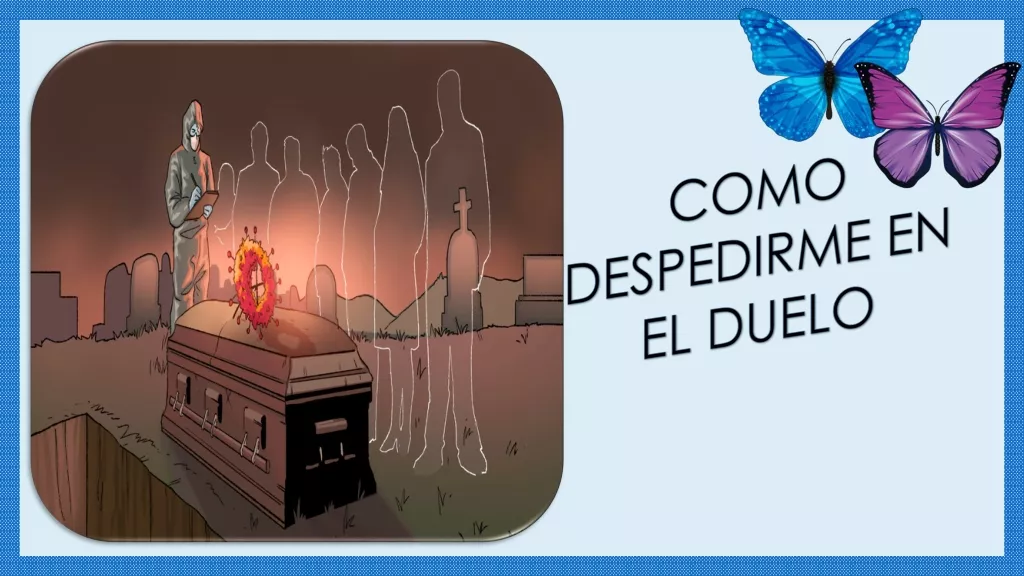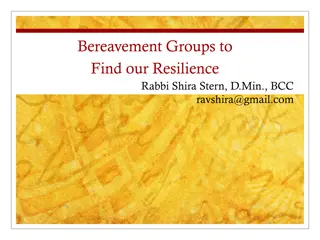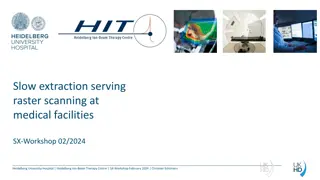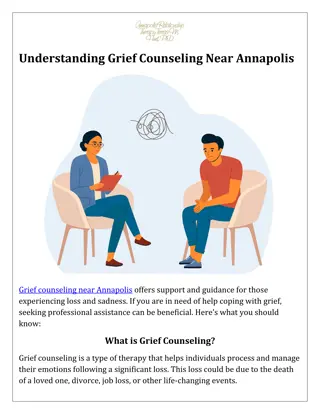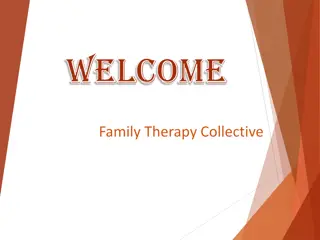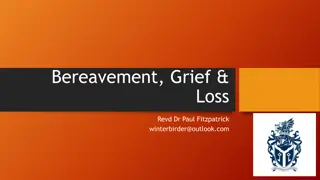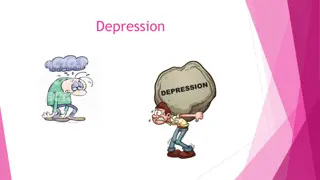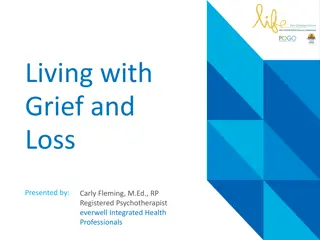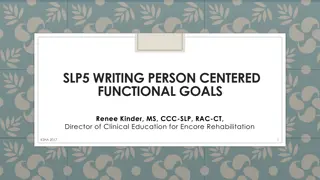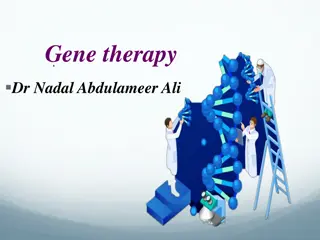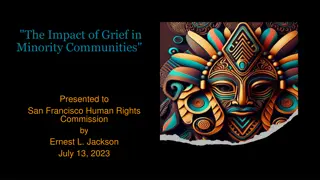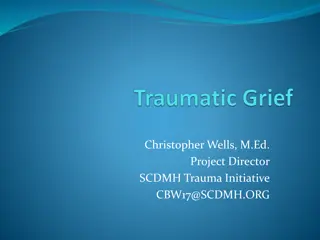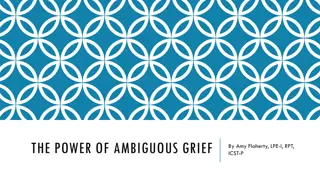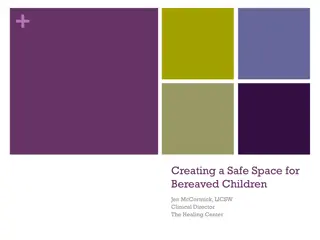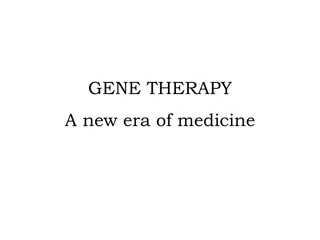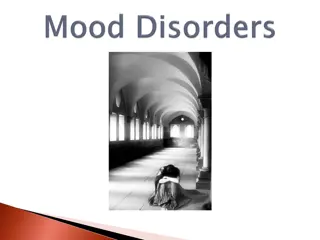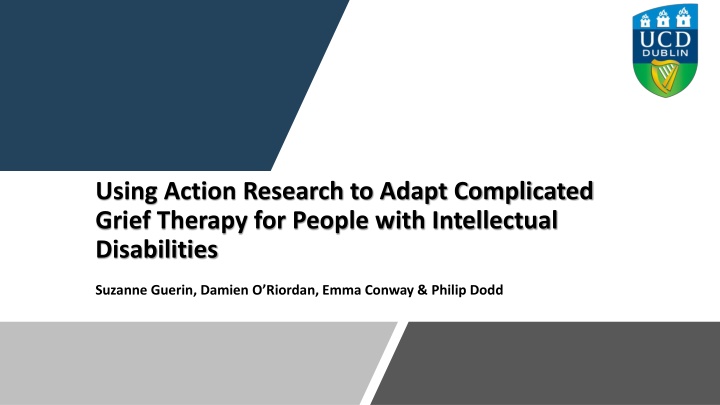
Adapting Complicated Grief Therapy for People with Intellectual Disabilities
Explore the use of Action Research to modify Complicated Grief Therapy for individuals with intellectual disabilities. Addressing the impact of bereavement and loss, the research delves into concepts like grief, mourning, and complicated grief. Recognizing the prevalence of complicated grief in this population, the study aims to enhance therapy approaches through a collaborative project between psychology and psychiatry experts.
Download Presentation

Please find below an Image/Link to download the presentation.
The content on the website is provided AS IS for your information and personal use only. It may not be sold, licensed, or shared on other websites without obtaining consent from the author. If you encounter any issues during the download, it is possible that the publisher has removed the file from their server.
You are allowed to download the files provided on this website for personal or commercial use, subject to the condition that they are used lawfully. All files are the property of their respective owners.
The content on the website is provided AS IS for your information and personal use only. It may not be sold, licensed, or shared on other websites without obtaining consent from the author.
E N D
Presentation Transcript
Using Action Research to Adapt Complicated Grief Therapy for People with Intellectual Disabilities Suzanne Guerin, Damien O Riordan, Emma Conway & Philip Dodd
Introduction Stroebe, Stroebe, & Hansson (1993) define key concepts as follows: Bereavement is the facts about the loss Grief is the emotional response to the loss Mourning as the ways in which grief is expressed. Bereavement research has acknowledged the significant impact of bereavement and loss on the lives of people with intellectual disabilities. Body of research on general bereavement experience in ID, as well as complicated grief reactions
Complicated Grief Recognised as a distinct grief process and occurs in 10% of the population generally Range of terms used in the area, with Prolonged Grief Disorder (ICD 11, 2019) and Persistent Complex Bereavement Disorder (DSM-5, 2013) common diagnostic terms. Risk factors include: Attachment to the person, social support, family conflict, understanding, type of death, multiple losses (Mason et al., 2020) Research has indicated the incidence of complicated grief as approximately 20% in people with ID (Dodd et al., 2008) 1/3 of bereaved people with ID experience 10 or more clinically apparent symptoms of CG (Dodd et al., 2008)
Complicated Grief Recent systematic review exploring research on complicated grief in PWID (O Riordan, Boland, Guerin, & Dodd, 2022). Delayed onset of grieving has been highlighted in parentally bereaved PWID (Bonell-Pascual et al., 1999; Dodd et al., 2005). Both traumatic grief symptoms (disbelief and bitterness over the loss) and separation distress symptoms (yearning for the deceased, being unable to think about anything other than the deceased, and distrust of others) are present post bereavement (Dodd et al., 2008; Dodd et al., 2021)
Complicated Grief Separation distress symptoms appear to occur more frequently than traumatic grief-type symptoms (Dodd et al., 2008; Dodd & Guerin, 2009; Gray & Abendroth, 2016; Dodd et al., 2021). Grief can be considered a general response to separation where an attachment has been broken (Bowlby, 1980) PWID may therefore be more vulnerable to developing attachment difficulties Dodd et al. (2008).
The Present Study Joint project between psychology and psychiatry Research Team: Dr Emma Conway, Senior Clinical Psychologist, HSE Dr Damien O Riordan, Senior Registrar, HSE Dr Philip Dodd, Consultant Psychiatrist, HSE Professor Suzanne Guerin, Professor of Psychology, UCD Project is focusing on adaptation of an evidence-based therapy for people ID and people with severe and enduring psychiatric illness with an associated cognitive impairment Using action research to record the decision-making process applied Today s presentation focuses on our work adapting CGT for use in intellectual disability
Complicated Grief Therapy Developed by Katherine Shear and colleagues in the University of Columbia A cognitive behavioural, trauma informed intervention 16 sessions in total Phase 1: Getting Started (Sessions 1-3) Phase 2: Core Revisiting Sequence (Sessions 4-9) Phase 3: Midcourse Review (Session 10) Phase 4: Closing Sequence (Sessions 11-16) Seven core themes explored in the therapy (Shear, 2015)
Seven themes of CGT Understanding grief Managing painful emotions Remembering loved ones Learning to live with reminders Thinking about the future Strengthening social relationships Telling the story of the death (Shear, 2015)
Challenge for Adaptation: An Example Session 4 - Introduction to imaginal revisiting Telling the story of the death as it happened in the present tense Recorded for listening to outside of session. Session 5 - Continue imaginal revisiting & introduce situational revisiting Exploring situations the person is currently avoiding Develop hierarchy Session 6 - Continue imaginal revisiting & Continue situational revisiting Discuss memories work Client encouraged to bring objects/photographs that remind them of the deceased person. Session 7 - Full core revisiting Imaginal revisiting Situational revisiting Memory work positive memories
Feedback regarding face validity, utility, and feasibility Process of Adaptation Review of Existing Manual Review and finalisation of manual Adaptation of each of the core sessions Pilot completed with small population of service users Reflective group discussion regarding adaptation process Initial review by professional peers working directly with PWID Intervention with larger group
Adaptation - Considerations Good literacy skills are essential as part of accessing conventional CGT therapy. Need to consider accessibility of the therapy for PWID Intervention needs to be restructured to allow more time for people to access key concepts/approaches CGT covers a lot of psychoeducation and information in each session needed to be streamlined for our population. Added an initial session (pre-intervention) to allow sufficient time to complete initial assessment and explain CGT to the service user. Session 1 split into two separate sessions.
Adaptation - Considerations Each handout has to be adjusted and simplified to ensure accessibility (e.g., simplification of language and concepts), Need to address self-directed work outside of sessions - includes reading information and grief/thought monitoring tasks. Introduction of a grief partner to support the person throughout the process. Use of pictures, items, and props in therapy e.g., the jars.
Supports for CGT Increasing body of research on capacity of people with ID to understand and discuss grief McEvoy and Colleagues (2012) identified that in a sample of people with mild-moderate ID only 24% had a full understanding of death, with 70% having an emerging understanding of the core concepts of death. Adaptation of CGD-ID good sensitivity and specificity from both carer and self-report(Dodd et al., 2008; Dodd et al., 2021). Self-report measure showed insight and ability for PWID to describe their own experience of complicated grief.
Current and Next Steps Reflections of experience to date: Everything takes longer than expected! Both adaptation and delivery! But confident that, with consideration, even difficult concepts can be adapted Currently conducting interviews with professionals with experience in ID to explore initial assessment of adapted materials Hope to conduct pilot study with a small number of adults with ID later in the year

